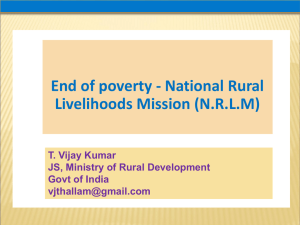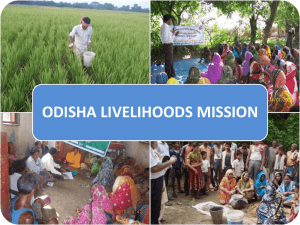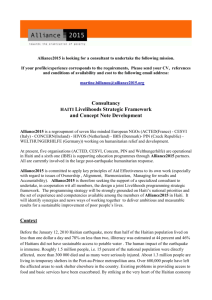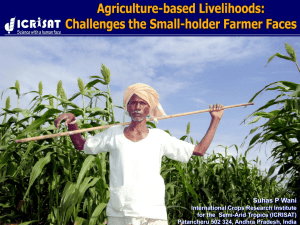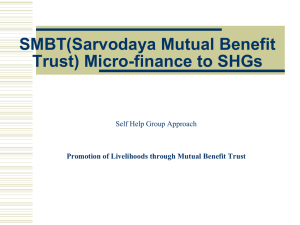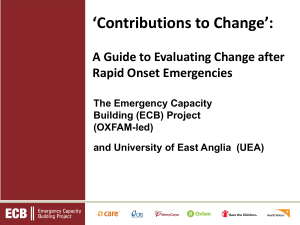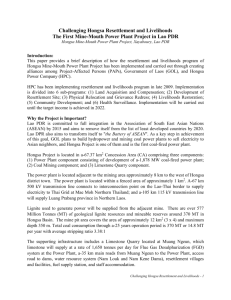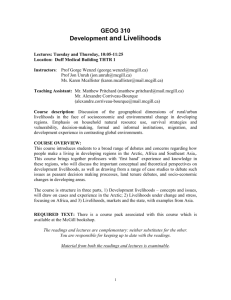Agriculture based Livelihoods: Opportunities and Potential
advertisement
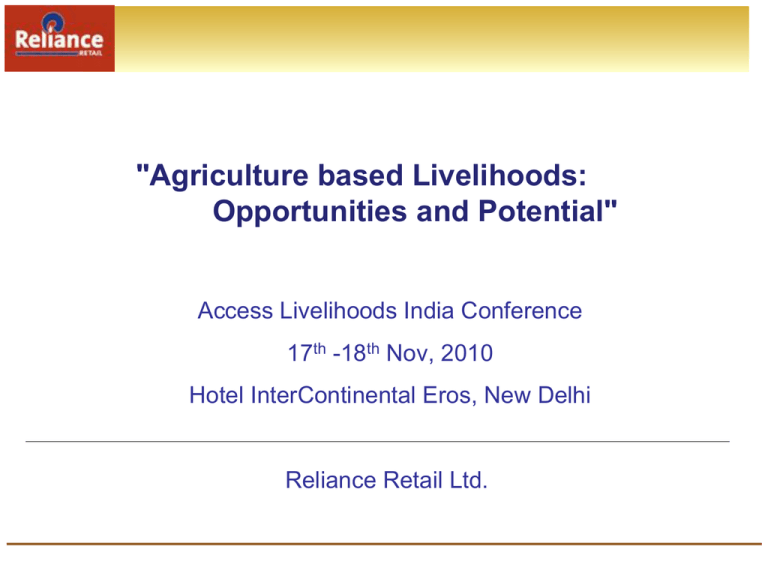
"Agriculture based Livelihoods: Opportunities and Potential" Access Livelihoods India Conference 17th -18th Nov, 2010 Hotel InterContinental Eros, New Delhi Reliance Retail Ltd. Access Livelihoods India Conference Reliance agri supply chain Reliance Retail created a farm to fork supply chain for fresh fruits & vegetables. Developed base with growers Retail operations spread across country Handling of all fruits & vegetables Different supply chain models as per product need 2 Access Livelihoods India Conference Reliance banana supply chain Established robust end to end supply chain for banana Inclusive business model – Co-opting the entire agri value chain Also caters to external customers Developing upon the strength of existing channel partners Reduce post harvest losses ,improve quality , better market access Profitable business proposition - scalable and sustainable model Win-Win situation - enhanced value to growers, customers and the company 3 Access Livelihoods India Conference Traditional Supply Chain Growers • Harvested in looms • Transported loose • Maturity stage based on distance travelled 4 Village level Consolidators • Finances growers • Arranges loading and transportation • Charges commission and cost incurred to growers Wholesalers in terminal markets Semi Wholesalers / Ripeners • Auctions in mandi • Finances consolidators • Extends credit to buyers • Charges commission and recovers advances & cost • Uses unscientific practices for ripening • Extends credit to retailers. • Also owns push carts • Gets known people from villages to operate them • Gives a price band to sell • Operator makes up for any loss • They get fixed amount per day paid as lump sum amount when leaving for home-town Retailers/ Consumers • Poor quality. • Low shelf life • Often sold at mark-down price Access Livelihoods India Conference Traditional Supply Chain Village auction Loading of loom 5 Loader standing on loom Loose transportation Conventional ripening Poor quality for customers Access Livelihoods India Conference Drawbacks – Traditional Supply Chain Many intermediaries - adding costs but little value addition No ownership of produce quality - No effort channelized towards reducing losses Once harvested, farmer is at the mercy of traders More than 30% of produce in the value chain becomes unsalable Waste handled in city – unhygienic environment and additional cost Financial value loss passed onto grower , quality value loss passed onto consumer Poor shelf life 6 Access Livelihoods India Conference Reliance Value Chain Growers • Buying directly from field • Fixed farm gate price • Payment linked to quality • Secured payment 7 Company appointed vendors • Trained on post harvest handling • Simple infrastructure/ gadgets to follow practices. • Fixed logistics cost per Kg • Payment on quality & quantity received at company • Weekly indent Company owned ripening facilities • Scientific ripening under controlled condition • Quality check of green fruit • Control of dump, shrink and transit loss of each consignment. • Dispatch quality check Distributors / Retailers Consumers • Purchases at fixed price • Consistent from company quality with • Price as per quality better shelf life • Daily supply as per • Appreciation of requirement ensures quality offered fresh stock available for willingness customers. to pay premium • Training on fruit display & handling • Retailing losses reduced with fruit at right stage of ripeness • Mark-downs minimized due to better shelf life Access Livelihoods India Conference Reliance Value Chain Transportation in crates De-handing Store display Ripening chamber Display at pushcart Washing Raw banana 8 Labled banana Access Livelihoods India Conference Reliance Value Chain – salient features Paradigm shift from trading driven operation to a value addition based supply chain Draws on strength of existing players but transforms role towards improving quality Purchase price fixed before harvesting – de-risking farmer from market uncertainty Secured payment to farmer as per commitment Right maturity stage harvesting – improves quality of fruit and productivity Price benchmarked with quality – motivates farmer to adopt practices for improving quality Tie ups for better planting materials to improve yield Developing existing channel partners for marketing produce 9 Access Livelihoods India Conference Major impact areas Improvement in farmers income Farmer access to new markets Reduction in losses Creation of rural employment Improved quality to consumer Environment friendly Benefits of the model enticed unorganized sector to adopt best practices Inclusive Innovative Agri model suited to the local context 10 Access Livelihoods India Conference Key milestones Sourcing from 40 banana growing clusters across the country Linkages with more than 2000 growers Developed 150 plus vendors for procurement Marketing in 16 major cities to internal as well as external customers. 100 plus distributors & organized retailers 11 Access Livelihoods India Conference Thank You! 12 Access Livelihoods India Conference

